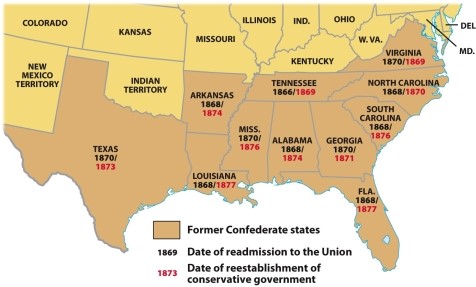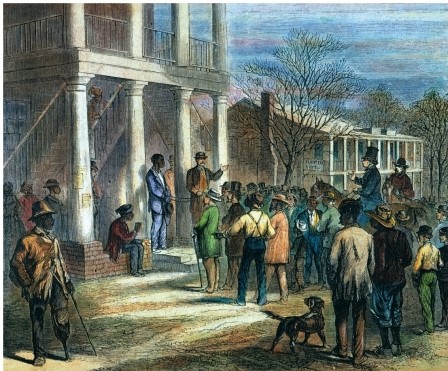Exam 16: Reconstruction
Exam 1: Ancient America Before77 Questions
Exam 2: Europeans Encounter the New World77 Questions
Exam 3: The Southern Colonies in the Seventeenth Century77 Questions
Exam 4: The Northern Colonies in the Seventeenth Century77 Questions
Exam 5: Colonial America in the Eighteenth Century77 Questions
Exam 6: The British Empire and the Colonial Crisis77 Questions
Exam 7: The War for America77 Questions
Exam 8: Building a Republic78 Questions
Exam 9: The New Nation Takes Form77 Questions
Exam 10: Republicans in Power77 Questions
Exam 11: The Expanding Republic77 Questions
Exam 12: The New West and the Free North28 Questions
Exam 13: The Slave South77 Questions
Exam 14: The House Divided77 Questions
Exam 15: The Crucible of War77 Questions
Exam 16: Reconstruction77 Questions
Exam 17: The Contested West77 Questions
Exam 18: Railroads, Business, and Politics in the Gilded Age77 Questions
Exam 19: The City and Its Workers77 Questions
Exam 20: Dissent, Depression, and War77 Questions
Exam 21: Progressivism From the Grass Roots to the White House77 Questions
Exam 22: World War I: the Progressive Crusade at Home and Abroad77 Questions
Exam 23: From New Era to Great Depression77 Questions
Exam 24: The New Deal Experiment77 Questions
Exam 25: The United States and the Second World War77 Questions
Exam 26: Cold War Politics in the Truman Years77 Questions
Exam 27: The Politics and Culture of Abundance77 Questions
Exam 28: Reform, Rebellion, and Reaction77 Questions
Exam 29: Vietnam and the End of the Cold War Consensus78 Questions
Exam 30: America Moves to the Right77 Questions
Exam 31: The Promises and Challenges of Globalization Since76 Questions
Exam 32: Citizenship, Indian Removal, Equality, Women's Rights, Native American Relations, Slavery, Religion, Labor, Westward Expansion, and North-South Differences.10 Questions
Exam 33: Historical Perspectives on American Politics and Society10 Questions
Select questions type
Who opposed President Andrew Johnson's reconstruction plan?
(Multiple Choice)
4.8/5  (33)
(33)
According to Map 16.3: The Reconstruction of the South, which former Confederate state was first to be readmitted to the Union? 
(Multiple Choice)
4.8/5  (43)
(43)
By the early 1870s, the congressional reconstruction goals of 1866
(Multiple Choice)
4.9/5  (39)
(39)
What problem plagued the Republican governments of the Reconstruction South?
(Multiple Choice)
4.8/5  (39)
(39)
How did Congress respond to southern Republicans' pleas for federal protection from the racism and violence of the Ku Klux Klan?
(Multiple Choice)
4.7/5  (41)
(41)
What did President Johnson do after Mississippi's rejection of legislation that outlawed slavery and South Carolina's refusal to renounce secession?
(Multiple Choice)
4.9/5  (38)
(38)
"In the contest between the nation and slavery, our unfortunate people have sided, by instinct, with the former. . . . We will work, pray, live, and, if need be, die for the Union, as cheerfully as ever a white patriot died for his country. The color of our skin does not lessen in the least degree, our love either for God or for the land of our birth. . . . We know the burdens of citizenship, and are ready to bear them. We know the duties of the good citizen, and are ready to perform them cheerfully, and would ask to be put in a position in which we can discharge them more effectually. . . .
This is a democracy-a government of the people. It should aim to make every man, without regard to the color of his skin, the amount of his wealth, or the character of his religious faith, feel personally interested in its welfare. Every man who lives under the Government should feel that it is his property, his treasure, the bulwark and defence of himself and his family. . . ."
Which of the following did the authors of the 1865 petition to the Union Convention of Tennessee use to justify black enfranchisement?
(Multiple Choice)
4.8/5  (40)
(40)
What did "Sherman land" and the establishment of the Bureau of Refugees, Freedmen, and Abandoned Lands demonstrate to southerners about Reconstruction?
(Multiple Choice)
4.9/5  (35)
(35)
The 1868 drawing Selling a Freeman to Pay His Fine at Monticello, Florida, equated the newly instated black codes to what? 
(Multiple Choice)
4.8/5  (32)
(32)
What was outlawed under the army's system of compulsory free labor in the South during and after the Civil War?
(Multiple Choice)
4.8/5  (44)
(44)
The election controversy ended with the Compromise of 1877, in which
(Multiple Choice)
4.8/5  (37)
(37)
None of the many shortcomings of Reconstruction disappointed former slaves more than the failure of the U.S. government to provide them with land of their own. Discuss events and legislation that occurred during the latter part of the Civil War and immediately following the Union victory (1864-65) and explain how they indicated to freedmen that the federal government intended to make some form of land ownership available to former slaves. Contrast those early promises with the realities of the later Reconstruction era, which in effect placed land ownership beyond the reach of all but a small fraction of blacks.
(Essay)
4.9/5  (37)
(37)
Supreme Court decisions in the years following the Civil War largely
(Multiple Choice)
4.9/5  (37)
(37)
According to the Military Reconstruction Act of 1867, what did a state have to do before gaining readmission to Congress?
(Multiple Choice)
4.7/5  (39)
(39)
The collapse of Reconstruction began in 1868, when Ulysses S. Grant was elected president. Explain how Grant's inept administration, his lack of political willpower, and the economic depression that occurred during his administration empowered southern Democrats to adopt home rule and end the Reconstruction experiment.
(Essay)
4.9/5  (38)
(38)
Match the term with the definition.
-Legislation passed by Congress that nullified the black codes and affirmed that black Americans should have equal benefit of the law. This expansion of black rights and federal authority drew a veto from President Johnson, which Congress later overrode.
(Multiple Choice)
4.7/5  (34)
(34)
"I have been in troble for about four yars my Dear wife was taken from me Nov 19th 1859 and left me with three Children and I being a Slave At the time Could Not do Anny thing for the poor little Children for my master it was took me Carry me some forty mile from them So I Could Not do for them and the man that they live with half feed them and half Cloth them & beat them like dogs & when I was admitted to go to see them it use to brake my heart & Now I say again I am Glad to have the honour to write to you to see if you Can Do Anny thing for me or for my poor little Children. . . ." What aspect of slavery did this letter writer focus on?
(Multiple Choice)
4.8/5  (50)
(50)
Explain the following statement: "By 1870, northerners had begun a retreat from the ideals of Reconstruction."
(Essay)
4.8/5  (38)
(38)
Showing 21 - 40 of 77
Filters
- Essay(0)
- Multiple Choice(0)
- Short Answer(0)
- True False(0)
- Matching(0)